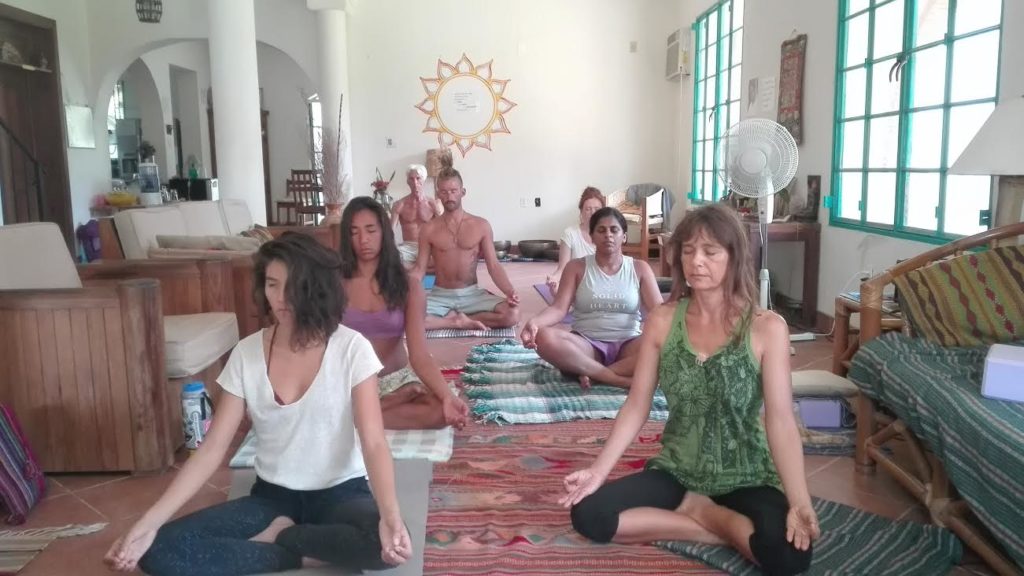Trauma Informed Yoga Therapy: A Safe Place for Welcoming What Arises

“Yoga is an ancient Hindu practice that has only recently been documented by the Western world for its potential therapeutic effects. An increasing number of empirical studies have reported positive effects of mind-body therapies for the treatment of mental disorders, such as depression and anxiety.”
Yoga is becoming household name, and a common sighting in every gym, studio or outdoor community space. This is an amazing opportunity for growth and evolution in our communities as yoga offers us the opportunity to practice mindfulness, connect with our body, and expand our spirituality in a way that connects with our beliefs.
It is through this mind, body spirit connection that we discover yoga is more than a physical practice. When we embrace yoga as a practice for the mind, body and spirit, we learn that yoga offers holistic remedies to serve us on and off our yoga mats in ways that modern day medicine cannot. One of these is “yoga therapy”.
There is a growing body of evidence from reputable research organizations like Harvard Medical School and the National Institute of Health which reveals the findings of multiple studies designed to measure the effectiveness of yoga as a form of therapy.
“By reducing perceived stress and anxiety, yoga appears to modulate stress response systems. This, in turn, decreases physiological arousal — for example, reducing the heart rate, lowering blood pressure, and easing respiration.”
As we consider the effectiveness of yoga as a therapeutic method of treatment, we can look at the work of a Sadhana Yoga School graduate, Kim Gebro. Kim is a sociologist, educator of 20+ years, Advanced Teacher of Yoga Therapy, Certified iRest® Meditation Teacher, and a Certified Warriors At Ease Teacher along with the 200-hour yoga teacher training she received with Sadhana. In the following excerpt she describes an experience with a recent patient.
“He started coughing violently, grasping at his throat, muttering, “He’s here. He’s here.” I sat more upright, took a few conscious breaths, and watched for a moment as my client became intimately aware of the physical sensations, emotions, and memories that were arising in his inner world. I felt the urge to jump in and comfort him in that moment, recognized it as my need to control the situation (his pain and suffering), and quickly bracketed that inclination as something for me to meet and work with at another time. After assessing his state and checking in with my intuition, I offered my client an opportunity to engage in an exploration of sensations, an experiment of sorts.
Using his right to choose the next step in his therapeutic process, he explored the sensation of his throat while keeping an inner resource, or sense of safety, in his back pocket, to be accessed at any time should he need a deeper sense of being grounded during this challenging work. As he explored the physical sensations of the throat, while toggling back and forth with another place in the body that felt more at ease, he was able to sense the shifting states of the mind and body as tension in the throat and fear of the impending man diminished. In later sessions, the man in the shadows would revisit and would be met using other techniques to release the trauma of his presence.”
This trauma informed integrative yoga therapy and meditation session was not unlike many others, revealing layers of mentally forgotten, but energetically present trauma. As yoga therapists facilitate experiences for their clients to develop interoception, the ability to sense what is arising in one’s inner world, pain that has been shaping clients’ thought patterns, emotions, physical health, and behavior for years will rise to the surface. Being skilled at creating trauma informed spaces, interactions, and invitational language becomes increasingly important as this process takes place.
Trauma informed modalities aid yoga therapy practitioners in creating a safe container for their clients in order to skillfully guide them in developing mind-body techniques that support their unique needs. There is nothing to be taken for granted when working with traumatized individuals: the use of language, the arrangement of the room, sounds, smells, facial expressions, tone of voice, equipment used, physical contact, and so on. Anything can trigger a traumatic event. It is not our responsibility to keep traumatic imprints at bay. In fact, helping our clients learn how to welcome all that arises from a place of conscious witnessing supports their abilities to become empowered to navigate the constantly changing seas of their inner world. It is with mindful presence and ability to know how to gracefully employ techniques, provide space, give guidance, and offer silence that creates the safe container for post-traumatic growth to occur
Today, medical care is costly for physician visits, medications and drugs, lost time at work and other costs associated with living with chronic anxiety, stress, pain, or trauma. Contemporary methods are arguably ineffective at treating the root cause of many issues and so they persist. It is because of this, that many people are turning to alternative, more holistic ways to care for their health and wellness.
In the years to come yoga therapy will continue to gain popularity and presence in our communities just as the physical practice has grown over the last 20 years. We hope it continues to shift the world to a great state of balance, health and happiness that will make the world a better place for us all.
If you are looking for more information on Yoga Therapy please visit the website below for Kim Gebro, and also visit www.anjilirussell.com, from SYS co-founder and co-owner Anjili Russell. Both young ladies are passionate about mental health, yoga and helping people.
Written in collaboration with:
Kim Gebro, M.Ed.
Trauma Informed Integrative Yoga Therapy & Meditation Specialist
Warriors At Ease NH Affiliate
Kim Gebro, LLC
www.kimgebro.com
https://www.facebook.com/kimgebro/
603-505-7001
Recommend0 recommendationsPublished in blog





Responses